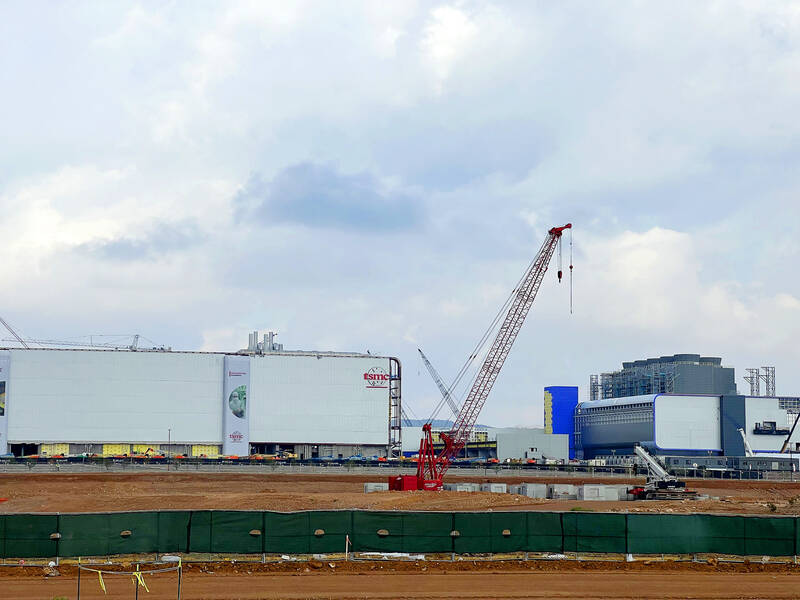Taiwan Semiconductor Manufacturing Co (TSMC, 台積電) yesterday said it is more than tripling its US investment to total US$40 billion as it plans to make 3-nanometer chips in 2026 at a second Arizona fab, adding to the chipmaker’s original plan of building a US$12 billion fab to make 5-nanometer chips in 2024.
The investment would mark the largest foreign direct investment in Arizona’s history and one of the largest foreign direct investments in the history of the US, the world’s largest contract chipmaker said in a statement yesterday.
In addition to the more than 10,000 construction workers at the site, TSMC’s two fabs are expected to create an additional 10,000 high-paying high-tech jobs, including 4,500 direct TSMC jobs, it said.

Photo: CNA
When complete, the two fabs would produce more than 600,000 wafers per year, with estimated end-product value of more than US$40 billion, the statement said.
“When complete, TSMC Arizona will be the greenest semiconductor manufacturing facility in the United States producing the most advanced semiconductor process technology in the country, enabling next-generation high-performance and low-power computing products for years to come,” TSMC chairman Mark Liu (劉德音) said in the statement.
US President Joe Biden was yesterday to visit the Arizona plant. The chipmaker’s investment is a big win for Biden after supply-chain issues disrupted the US economy early in his presidency.
Joining Biden on his visit to promote efforts to boost US technology manufacturing were expected to be Apple Inc chief executive Tim Cook, TSMC founder Morris Chang (張忠謀), Micron Technology chief executive Sanjay Mehrotra and Nvidia founder and chief executive Jensen Huang (黃仁勳), among others, the White House said.
They were to attend a “tool-in” ceremony, which is the symbolic moving of the first equipment onto the shop floor of the new US$12 billion facility.
The plant is scheduled to be operational in 2024.
“Bringing TSMC’s investment to the United States is a masterstroke and a game-changing development for the industry,” Huang said in remarks prepared for yesterday’s event.
US semiconductor production now accounts for just 12 percent of the global total, down from 37 percent two decades ago, a White House report on supply-chain problems last year said.
Taiwan’s dominant position as a maker of chips used in technology from mobile phones and vehicles to fighter jets has sparked concerns of over-reliance on the nation, especially as China ramps up its military pressure.
“The occasion for the president’s travel is to mark a significant milestone that TSMC is reaching in bringing the most advanced semiconductor manufacturing back to the US,” US National Economic Council Director Brian Deese said.

A magnitude 7.0 earthquake struck off Yilan at 11:05pm yesterday, the Central Weather Administration (CWA) said. The epicenter was located at sea, about 32.3km east of Yilan County Hall, at a depth of 72.8km, CWA data showed There were no immediate reports of damage. The intensity of the quake, which gauges the actual effect of a seismic event, measured 4 in Yilan County area on Taiwan’s seven-tier intensity scale, the data showed. It measured 4 in other parts of eastern, northern and central Taiwan as well as Tainan, and 3 in Kaohsiung and Pingtung County, and 2 in Lienchiang and Penghu counties and 1

FOREIGN INTERFERENCE: Beijing would likely intensify public opinion warfare in next year’s local elections to prevent Lai from getting re-elected, the ‘Yomiuri Shimbun’ said Internal documents from a Chinese artificial intelligence (AI) company indicated that China has been using the technology to intervene in foreign elections, including propaganda targeting Taiwan’s local elections next year and presidential elections in 2028, a Japanese newspaper reported yesterday. The Institute of National Security of Vanderbilt University obtained nearly 400 pages of documents from GoLaxy, a company with ties to the Chinese government, and found evidence that it had apparently deployed sophisticated, AI-driven propaganda campaigns in Hong Kong and Taiwan to shape public opinion, the Yomiuri Shimbun reported. GoLaxy provides insights, situation analysis and public opinion-shaping technology by conducting network surveillance

‘POLITICAL GAME’: DPP lawmakers said the motion would not meet the legislative threshold needed, and accused the KMT and the TPP of trivializing the Constitution The Legislative Yuan yesterday approved a motion to initiate impeachment proceedings against President William Lai (賴清德), saying he had undermined Taiwan’s constitutional order and democracy. The motion was approved 61-50 by lawmakers from the main opposition Chinese Nationalist Party (KMT) and the smaller Taiwan People’s Party (TPP), who together hold a legislative majority. Under the motion, a roll call vote for impeachment would be held on May 19 next year, after various hearings are held and Lai is given the chance to defend himself. The move came after Lai on Monday last week did not promulgate an amendment passed by the legislature that

AFTERMATH: The Taipei City Government said it received 39 minor incident reports including gas leaks, water leaks and outages, and a damaged traffic signal A magnitude 7.0 earthquake struck off Taiwan’s northeastern coast late on Saturday, producing only two major aftershocks as of yesterday noon, the Central Weather Administration (CWA) said. The limited aftershocks contrast with last year’s major earthquake in Hualien County, as Saturday’s earthquake occurred at a greater depth in a subduction zone. Saturday’s earthquake struck at 11:05pm, with its hypocenter about 32.3km east of Yilan County Hall, at a depth of 72.8km. Shaking was felt in 17 administrative regions north of Tainan and in eastern Taiwan, reaching intensity level 4 on Taiwan’s seven-tier seismic scale, the CWA said. In Hualien, the